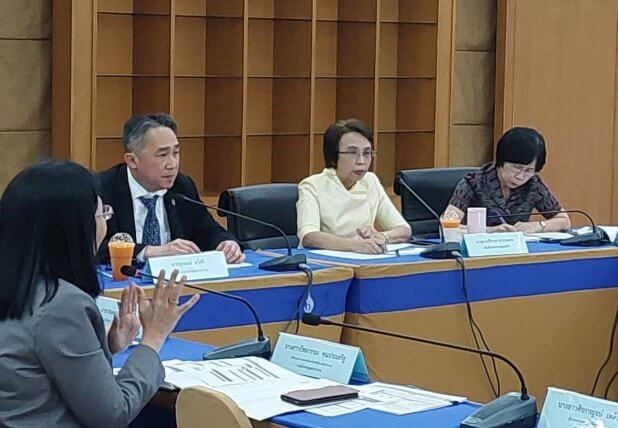
Ms. Preeyaporn Suwanaged, Director General of the Pollution Control Department (PCD), met and discussed with Dr. Chulapong Taweesri, Director General of the Department of Industrial Works (DIW), along with executives and officials at the Department of Industrial Works. They discussed the roles and missions of the two agencies to collaboratively prevent and solve pollution problems in all areas, including water, air, waste, and hazardous waste.
Ms. Preeyaporn said that industrial production is an important part of building the economy of the country. However, promotion of the industrial sector must be carried out along with supervision to prevent pollution that affects the environment and public health. PCD and DIW have missions and roles in preventing and solving pollution problems, both within the country and international cooperation. They discussed the matter of their collaboration closely in the same direction to support government policy for national development and maintain good environmental quality.
Both agencies have agreed to collaborate on various issues as follows:
– Developing a plan for a Pollutant Release and Transfer Register (PRTR) system for factories.
– Designating wastewater treatment system operators under Section 73 and using data from Department of Industrial Works’ wastewater treatment reporting system to report information under Section 80 of the Enhancement and Conservation of the National Environmental Quality Act, B.E. 2535 (1992).
– Setting control values for carbon disulfide emissions from fiber production plants and piloting an automatic odor monitoring system to surveil factory odor issues.
– Proposing methods to utilize funds from the Environmental Fund and the Groundwater Fund for the restoration of contaminated areas pending litigation.
– Jointly conducting preventative inspections of factories at risk of emitting pollution across 22 categories.
– Updating regulations to enable 105 types of factories to manage hazardous waste from communities.
– Establishing guidelines to control import-export of waste plastics, solar panels, and used electric vehicle batteries under the Basel Convention on the Control of Transboundary Movements of Hazardous Wastes and Their Disposal.
– Issuing measures and regulations for managing End-of-life Vehicles.
In their discussion, the executives of both agencies exchanged opinions on their collaboration to drive pollution management in all dimensions by using academic principles and laws enforcement to ensure the sustainability of environmental quality and quality of life for the public, Ms. Preeyaporn said.
